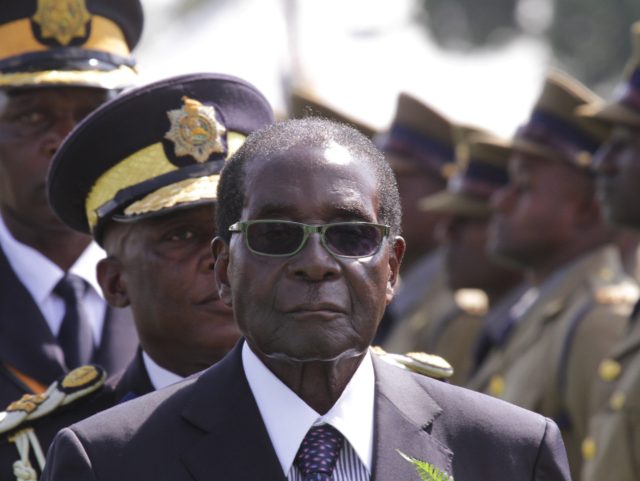Cecil, a 13-year-old lion that was, for many Zimbabweans, the sole source of pride in an otherwise hellish dictatorship, is dead. His death at the hands of an American dentist has done what the deaths of tens of thousands of Zimbabwean humans have failed to do since Robert Mugabe’s ascendance to head of state: get Americans to care about Zimbabwe.
Under Mugabe, Zimbabwe is a socialist tyranny with a bloody history of genocide, where thoughts are tightly controlled and socialist policies have turned a fertile land into a starving nation. Cecil’s death at the hands of the human ego is certainly unfortunate, but its relevance has been magnified to heights where the death of any of the tens of thousands killed to feed Mugabe’s ego have never gone.
Brian Pellot of Religion News describes the phenomenon as a “Simba and Mufasa” effect: “But when man bites dog, or when man shoots lion with an arrow, Americans conjure up images of Simba and Mufasa, the only reference many have to a continent of 1.1 billion people three times the size of their own country, and they lose their proverbial scat.” He writes cynically, “Assuming Zimbabwe won’t make the news again until dictator Robert Mugabe finally dies, allow me to capitalize on Cecil’s demise with a quick rundown of the country’s atrocious human rights record.”
That record is a brutal one, worthy of a man whose international allies seem to be exclusively fellow bloody dictators. Rising to prominence as an alleged anti-colonialist leader looking to empower the nation’s black population, Mugabe’s redistribution of land ensured that what was once a thriving farm industry collapsed into itself. Writing for The Atlantic in 2003, now-American UN Ambassador Samantha Power describes the steep decline in food production under Mugabe:
Maize farming, which yielded more than 1.5 million tons annually before 2000, is this year expected to generate just 500,000 tons. Wheat production, which stood at 309,000 tons in 2000, will hover at 27,000 tons this year. Tobacco production, too, which at 265,000 tons accounted for nearly a third of the total foreign-currency earnings in 2000, has tumbled, to about 66,000 tons in 2003.
Those not killed by starvation were killed by genocide. Mugabe, we now know thanks to years of research, was the chief organizer of the 1983 genocide known as the “Gukurahundi,” a Shona word for “the early rain which washes away the chaff before the spring rains.” Mugabe, then Prime Minister, explicitly ordered the killing of more than 20,000 people belonging to the Ndebele ethnic minority in western Zimbabwe. The Ndebele largely supported then-Mugabe rival Joshua Nkomo, and were killed by the thousands for it by Zimbabwe’s Fifth Brigade, a North Korea-trained killing squad under Mugabe’s direction.
While the Gukurahundi represents the most intense outburst of violence in Mugabe’s political history, he remains a violent leader. “Elections” in 2008 led to at least 85 civilian deaths and 1,300 politically motivated attacks, described by The Telegraph as ranging from “the wanton destruction of property to vicious murders.”
A particular target of Mugabe’s ire, aside from political dissidents, are LGBT people. Mugabe has vowed to make Zimbabwe “hell” for gays, lesbians, transgender people, and others of queer identity, calling LGBT identity “taboo” and mocking even President Barack Obama for supporting gay rights, threatening to propose marriage to him. Rhetoric aside, life for Zimbabweans of LGBT identity is teeming with threats and violence. As Human Rights Watch notes, LGBT Zimbabweans face numerous dangers, including “attacks on LGBT people, arbitrary arrests of LGBT activists by police, and the harassment by state agents of GALZ in previous years.”
But, save for a few remarkable workers at select NGOs and charity organizations, prominent Americans have remained largely silent to the abuses of the Mugabe regime, to Mugabe’s great benefit.
As my colleague Joel Pollak succinctly put it, “Could there be any better illustration that black lives do not matter to our liberal media and political elites?” That is only half the story; the American elites’ clear lack of interest in the massacres following the Arab spring in Egypt, Tunisia, and Algeria– as well as the post-Qaddafi Islamist black hole that is Libya– proves the apathy has less to do with black skin than it does with Africa itself. Elites lamenting the death of Cecil the Lion, those who have shown little to no interest in anything African before outside of very isolated human rights “fads” have written an entire continent off as irredeemable, save for its ability to assuage the guilted ego of the privileged.
Human rights concerns in China, or eastern Ukraine, or Guantánamo Bay are perceived as somehow more solvable– battles worth fighting. The plights of Boko Haram victims in Nigeria, or the albino of Tanzania, or civilians caught in the chaos of the Central African Republic are completely ignored until a scrappy marketer finds the right slogan to get people to care for a few months. By way of example, before Cecil the Lion, Jimmy Kimmel’s public forays into Africa included patronizing a South African safari and making fun of the fake sign language interpreter at Nelson Mandela’s memorial service.
“Cecil the Lion” is a great catchphrase, as good as “Band Aid,” “Darfur,” “Joseph Kony,” and “Bring Back Our Girls” (sadly all better than “Gukurahundi”). It is telling that Ethiopia, no matter what President Obama says, is still anything but “democratic;” those refugee camps in Darfur are still full; Joseph Kony is still free, and the Nigerian schoolgirls are not. Optimists may hope that the Cecil movement does more for lions than any of these past movements have done for humans, but history suggests Cecil will end up on the shelves of niche history like all the others, filed somewhere between “Golden-Voiced Homeless Man” and “Gangnam Style.”

COMMENTS
Please let us know if you're having issues with commenting.